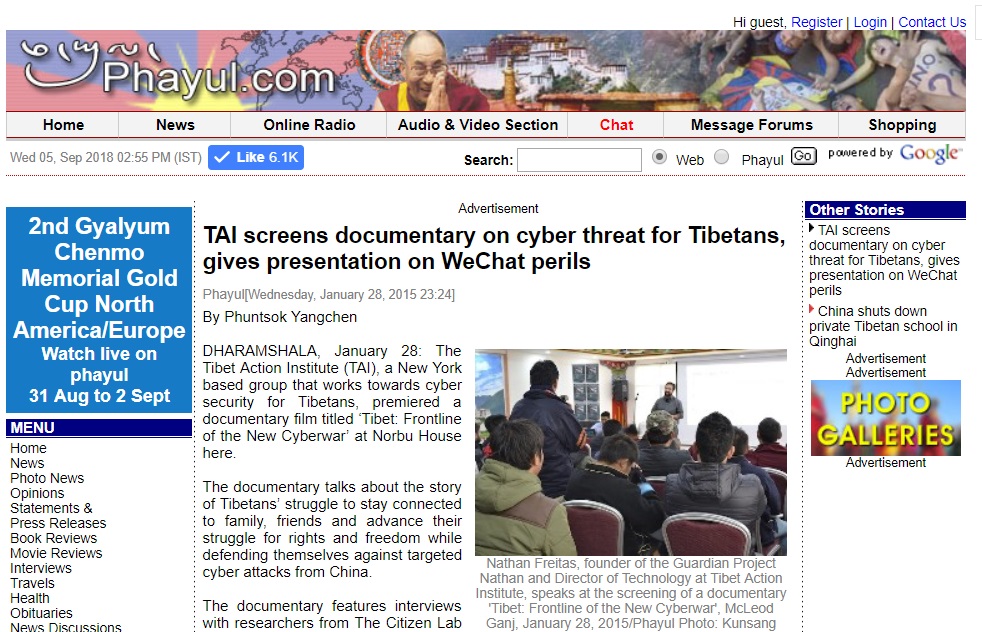TAI screens documentary on cyber threat for Tibetans, gives presentation on WeChat perils
DHARAMSHALA, January 28: The Tibet Action Institute (TAI), a New York based group that works towards cyber security for Tibetans, premiered a documentary film titled ‘Tibet: Frontline of the New Cyberwar’ at Norbu House here.
The documentary talks about the story of Tibetans’ struggle to stay connected to family, friends and advance their struggle for rights and freedom while defending themselves against targeted cyber attacks from China.
The documentary features interviews with researchers from The Citizen Lab at the Munk School of Global Affairs, University of Toronto, whose ground-breaking 2009 GhostNet report exposed a major Chinese cyber espionage network targeting state, private and civil society actors globally, including the offices of the Dalai Lama and Tibetans worldwide.
Speaking at the launch was Nathan Freitas, the Director of Technology at TAI and the founder of the Guardian Project, who gave a presentation on global rise of WeChat, the China based popular messaging application and its ramifications for users.
Nathan said that the film aims to not only spread awareness about the risks but also to let Tencent, a China based company which owns WeChat, know that they are being watched. “If they think they can get away with these things, if they think Tibetans being arrested for using WeChat is not being noticed, then they are wrong,” said Nathan.
Nathan gave similar presentation at Google conference in San Francisco and Harvard University.
He also explained the importance to protect WeChat users and secure information online. “Everyone needs to secure their information online and we just need to push WeChat to do what Google has done. Google has pushed back against the US government surveillance by strengthening their technology saying we must protect our users first.
“And I think pressuring Chinese companies to say stand up for yourself, don’t bow to your corrupt officials if you want to be multi-trillion dollar global corporation, it’s great. Just protect your users.”
There are over 400 million WeChat users worldwide with 70 million users outside China. WeChat is also the fastest growing chat application globally in 2013 and 2014 and the first Chinese export application.
Telo Rinpoche, Representative of His Holiness the Dalai Lama in Moscow, Russia; Thupten Samphel, Director of Tibet Policy Institute; and representatives of Tibetan NGOs and organisations attended the screening of the documentary and the presentation.
WeChat is a text and voice messaging communication service widely used by Tibetans inside and outside Tibet. It has become the most used mode of communication through its walkie-talkie style messaging facility. However, activists and experts fear that the app’s voice-messaging service enables security officials to monitor users’ movements in real time and access other information shared via the app.
Lobsang Gyatso Sither, Digital Security Program Manager at Tibet Action Institute said that with the development of technology in Tibet and in exile, it (WeChat) has became an easy mode of communication but that the technology comes with its own risks with arrests of many Tibetans for sharing information.
“Both as individuals and as community, Tibetans are being targeted by some of the most sophisticated malware attacks and cyber surveillance on the planet, said Sither. “But as long as we equip ourselves with the knowledge and skills to defend against China’s attacks. Technology can be one of our most powerful weapons in the Tibetan struggle.”




